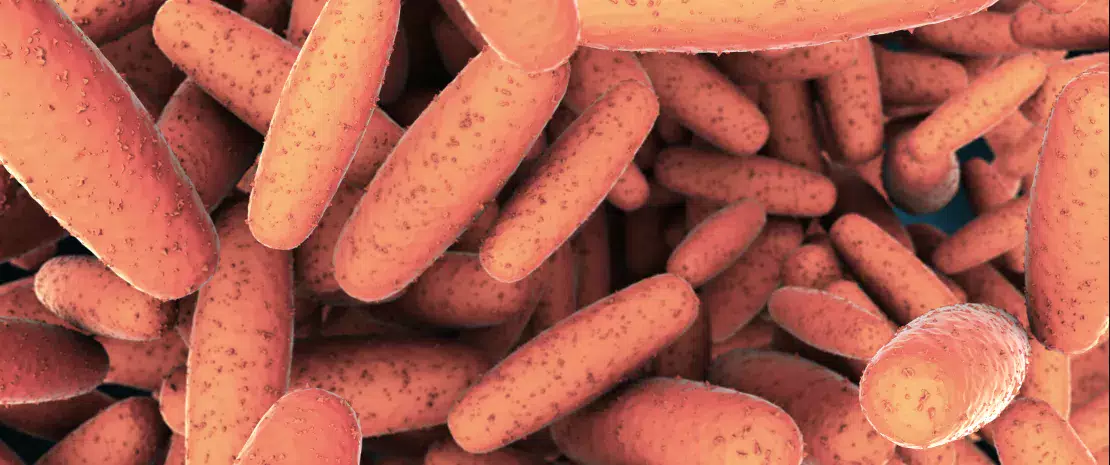The gut microbiome and chronic inflammatory diseases
Press review
By Pr. Markku Voutilainen
Turku University Faculty of Medicine; Turku University Hospital, Department of Gastroenterology, Turku, Finland
Lay public section
Find here your dedicated section
Sources
This article is based on scientific information
Sections

3D illustration of Pasteurella multocida bacteria. This is a Gram-negative, non-motile, penicillin-sensitive coccobacillus belonging to the Pasteurellaceae family.
About this article
Author
The authors have reviewed gut microbiota alterations in chronic inflammatory diseases.[1] Chronic inflammatory bowel diseases (IBD), rheumatoid arthritis (RA), ankylosing spondylitis (AS), psoriasis/psoriatic arthritis (Ps/PsA) and systemic lupus erythematosus (SLE) are the major chronic immune-mediated diseases (IMID) affecting globally 5–8% of the population. Environmental stimuli initiate pathological immunological response in genetically susceptible individuals. Gut microbiome may start aberrant immune responses.
Ulcerative colitis and Crohn’s disease are the two most common types of IBD in the western world, but their prevalence has increased globally. IBD is a chronic and incurable disease with low mortality most often diagnosed at a young age, which leads to compounding prevalence of IBD. IBD patients have an increased risk for other immune mediated diseases such as Ps, RA, AS and primary sclerosing cholangitis.
IBD patients have increased number of Proteobacteria (e.g., adherent-invasive Escherichia coli), Pasteurellaceae, Veillonellaceae, Fusobacterium and Rumincoccus gnavus. IBD patients typically have lowered number of Clostridium groups IV and XIVa, Bacteroides, Suterella, Roseburia, Bifidobacterium and Faecalibacterium prausnitzii. Of the fungi, Saccharomyces cerevisiae is lowered. Of viruses, Caudovirales are higher in IBD patients.
Similarly to IBD, patients which multiple sclerosis have lower abundance of Faecalibacterium suggesting that this could be a sign of systemic inflammation. RA probably starts at the oral or gut mucosa and autoimmunity to citrullinated proteins is a typical phenomenon. Also in RA patients, a reduction of Faecalibacterium and increase in Actinobacteria was reported. We do not know whether gut dysbiosis is a cause or effect of RA. Of viral infections, parvovirus B 19 and hepatitis C are associated with increased RA risk. Also patients with AS, Ps/PsA, and SLE reportedly have altered gut microbiome profile.
In the gut, protective bacteria increase beneficial metabolites like butyrate and polysaccharide A stimulating regulatory T-cell production. Decreased abundance of these bacteria is typical for IMIDs leading diminished immune tolerance. Dysbiosis and increased gut permeability may stimulate dendritic cells at the gut mucosa resulting the production of inflammatory cytokines. Increase in xenobiotic metabolites (e.g. methane) stimulates TH 17 cells, which play important role in IMID pathogenesis. Stimulation of proteases may generate production of autoantigens typical for IMIDs. A decrease in butyrate- producing bacteria is typical for IBD and other IMIDs.
Long-term diet influences to gut microbiome profile, but also acute changes are detected. A change from animal-based diet to a plant-based diet alters gut microbiome within one day. The single diet components studied include animal, whey and pea protein, high/low fat, high saturated/ unsaturated fat, lactose, artificial sweetener, fiber, resistant starch, probiotics and polyphenols. Mediterranean and vegetarian diet increase gut bacterial diversity, whereas western and gluten-free diet may decrease microbial diversity. Decreased bacterial diversity and loss of short-chain fatty acid producing bacteria are associated with IBD.
Dysbiosis profiles are common for IMIDs, but some dysbiosis subtypes are specific for single disease. Possibly a set of microbial metabolites produced by a variety of microbial compositions could be involved in the pathogenesis of IMIDs. Microbiome’s functional profile may be the decisive factor in the IMID pathogenesis.
IBD, other IMIDs and metabolic diseases are associated with westernized lifestyle (diet, increased sanitation). Hygiene practices and the use of antibiotics may lead to unfavorable alterations of the microbiome, which could cause disorders in the maturation and function of the immune system. Probiotics and antibiotics are not effective treatments for IBD. Also only one third of ulcerative colitis patients reach remission after fecal microbial transplantation. The authors conclude that dysbiosis may not be specific for IBD but generally modulate the immune system. People may be genetically programmed to respond to immune changes in different organ systems leading to different IMIDs.







